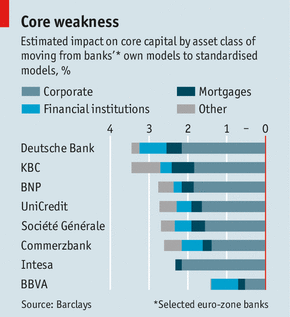(单词翻译:单击)
The asset-quality review
资产质量审查
Gentlemen, start your audits
先生们,开始审计吧
Close scrutiny of Europe’s banks may turn up unexpected shortfalls
对欧洲银行的密切关注可能会变成意外的资金短缺
Oct 5th 2013 |From the print edition
THE ink on the agreements that will hand supervision of the euro area’s biggest banks to the European Central Bank (ECB) is barely dry. Yet the ECB is already enmeshed in squabbles with national banking supervisors over the extent of its powers and the rigour with which it will undertake its first big task, a warts-and-all review of the balance-sheets of the banks it will take charge of in a year’s time.
欧元区刚刚敲定将欧元区的监管权交给欧洲最大的银行欧洲中央银行的协议。然而,欧洲央行已经卷入与国家银行监管机构的争吵之中,争吵围绕其权利范围以及其承担第一大任务之严格。其将会在一年时间里审查所有银行的资产负债表。
Details over how the ECB will conduct this asset-quality review (AQR) will probably be released in the second half of October, but the outlines are already beginning to emerge. The main aim of the review is to ensure that the ECB is not embarrassed by the revelation of holes in the balance-sheets of its new charges. Fresh in its mind is the example of the European Banking Authority (EBA), a young European regulator that lost much of its credibility after the collapse of banks that had passed its stress tests only months earlier.
虽然关于欧洲央行如何进行资产质量审查的详细细节可能会在十月下半月公布,但是大体状况已经开始初现端倪了。这次审查的主要目的是确保欧洲央行新接管的这些银行的资产负债表的缺口不会让其尴尬。欧洲银行管理局的例子还让人记忆犹新,这个年轻的欧洲监管机构由于通过其压力测试的银行纷纷崩溃而在几个月前失去了公信力。
To avoid that danger the ECB is emphasising that the AQR is not a stress test, which would simulate the effect of various economic scenarios on banks’ balance-sheets. Instead it is doing a preliminary examination to ensure that it understands what is on banks’ books in the first place. National regulators fret that they will be embarrassed by what it finds. This has prompted some to push back hard to limit the scope of the ECB’s inquiries.
为了避免上述危险,欧洲央行强调资产质量审查不是一次压力测试,模拟各种经济情况对资产负债表的影响。取而代之的是,它会做一次初步检查确保其会在第一时间了解银行的状况。国家监管机构担心他们会对央行的发现感到尴尬。这已经促使一些人强硬地限制了欧洲央行查询范围。
Surprisingly, this resistance is not coming from countries on Europe’s periphery such as Spain (see article), which have much to gain from the imprimatur of ECB supervision. Rather it is coming from core countries such as France and, to a lesser extent, Germany, where seemingly well-capitalised banks may come out of the asset review looking threadbare.
令人惊讶的是,这种阻力不是来自诸如西班牙的欧洲外围国家,西班牙很需要欧洲央行监管的首肯。相反,这种阻力是来自法国等核心国家,还有德国的反对,只不过程度稍轻。这些国家看似资金充裕的银行可能会出现难看的资产审查结果。
One issue is the “risk weighting” of assets, a process by which banks adjust the size of their capital buffer to account for the riskiness of their lending. Studies by both the Basel Committee, a club of central bankers and supervisors, and the EBA have found wide and unjustifiable variations in the way banks risk-weight their assets, even when asked to do so for identical hypothetical portfolios. The consequences of such variations can be significant. If the euro area’s biggest banks were forced to abandon their internal risk-weighting models and instead apply cruder standardised models, many would see their core-capital ratios decline by several percentage points (see chart). The ECB is likely to push for greater consistency in risk weighting, which could force banks in France, Germany and elsewhere to raise capital.
其中一个问题是资产的风险加权,通过风险加权,银行可以调整资本缓冲规模冲抵其贷款风险。央行行长和监事俱乐部巴塞尔委员会和欧洲银行管理局的研究发现银行中广泛存在各种不合理的资产风险权重方式,甚至是为了相同的假设投资组合。这些方式的后果是严重的。如果欧元区最大的银行被迫放弃他们内部的风险权重模型,许多银行会发现它们的核心资本比率下降几个百分点(见表)。欧洲央行很可能会推行更大规模统一的风险权重,会迫使法国德国以及欧洲其他地方的银行筹集资金。

Informed observers also expect the ECB to find evidence of “regulatory forbearance” in these markets, whereby supervisors have allowed banks to fudge the level of non-performing loans on their books, restructuring loans and easing repayment terms instead of taking write-downs. Adjusting for this could also open up capital holes. A process devised by Germany and France to shore up confidence in weak banks on Europe’s periphery may end up hitting a quite unexpected target.
消息灵通的观察家同时预计欧洲央行将找到在这些市场“监管纵容”的证据,在这些市场,监管机构允许银行在资产负债表上对不良贷款程度作假,重组贷款,延长还款期,而不是采取减记。对此作出调整可能会导致资金缺口。由法国德国设计的提振欧洲外围国家银行信心的方法可能会以击中一个意想不到的目标而告终。


